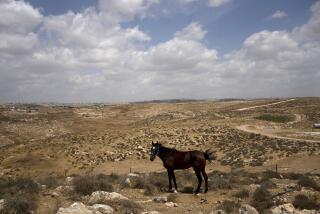Jewish Settlers Urged to Resist Palestinian Police : Israel: Leaders call for use of weapons if necessary. But government says it won’t back off from historic accord.
- Share via
JERUSALEM — Leaders of the Jewish settlers in the West Bank and Gaza Strip called on their communities Sunday to resist, with firearms if necessary, the new Palestinian police force that will begin operating there under an Israeli agreement with the Palestine Liberation Organization.
Defiant in the face of the Israeli government’s strong warnings that it will use troops to maintain order, the settler leaders made clear their own determination to upset the Palestinian autonomy accord through repeated confrontations.
“We recommend that every Israeli citizen not obey the orders of any Palestinian policeman,” said Uri Ariel, secretary general of the Council of Jewish Communities in Judea, Samaria and Gaza. “Even a traffic ticket we don’t accept. They are an enemy.”
Urging Jewish residents of the West Bank and Gaza Strip to use their guns in anticipated confrontations with members of the Palestine police, Ariel said: “Any Israeli citizen whose life is endangered by Palestinian policemen should behave as in other life-threatening situations--use his weapons in self-defense.”
But Prime Minister Yitzhak Rabin, returning from a trip to the United States and Canada, reiterated his government’s commitment to the accord with the PLO, including its provisions for the pullback of Israeli forces in the West Bank and Gaza Strip and the deployment there of the Palestine police.
“I am determined, the government is determined, to pursue (implementation of the agreement) regardless of the ups and downs in public opinion polls as long as the Knesset (the Israeli Parliament) majority is for it, and we have that majority,” Rabin said.
PLO and Israeli negotiators are near agreement on the implementation of the 15,000-member Palestinian police force for the Gaza Strip and the Jericho District in the West Bank, Police Minister Moshe Shahal said. The force would have light arms, automatic weapons and some armored vehicles, Shahal said.
In preparation for the Israeli army’s withdrawal from these two areas, a process that is scheduled to begin Dec. 13, PLO Chairman Yasser Arafat ordered 7,000 to 9,000 members of the Palestine Liberation Army to regroup in Egypt and Jordan from their bases in Arab countries and form the core of the Palestine police.
“They will do one shift as police and a second as gunmen,” Ariel declared, arguing that Jewish settlers will be able to trust their security to no one but themselves.
The accord with the PLO leaves overall security of the territories with Israel and says that Israel will continue to protect the settlers. But Palestinians have demanded in the current negotiations that all remaining Israeli troops be based within the settlements, not outside them, and that they turn over other security tasks, such as highway patrols, to the Israeli police.
Zvi Hendel, leader of the small Jewish settlements in the Gaza Strip, rejected this proposal as too disruptive. “When someone gets home, they should have a little peace and quiet and not have the army in their yards,” Hendel said. “Besides, we’re not the security threat--the Palestinians are.”
Facing a potentially bloody rebellion among the 125,000 Jewish settlers living in the West Bank and Gaza Strip, Rabin is now battling to hold together the constituency that voted his center-left coalition into office in June, 1992, to make peace and that appears to be having some qualms about the costs of the deal with the PLO.
But Rabin’s contention that the agreement will bring an end to the century-long conflict with the Palestinians and thus with the rest of Israel’s Arab neighbors has been dramatically undercut by the killing of 12 Israelis, some of them soldiers but others civilian settlers, since the agreement was reached in September. Twenty-one Palestinians have been killed in clashes in that period.
A public opinion survey conducted for Yesha, the settlers’ council, showed that 52% of those questioned in a telephone poll believe that the agreement with the PLO should be abrogated if Palestinian attacks on Israelis continue.
The survey, conducted by an urban planning firm in Tel Aviv, also showed that 58% of Israelis professed support for the settlers’ efforts and that only 25% oppose them, contrary to government claims that the settlers’ actions have little broad-based support.
Another survey, conducted for the newspaper Yediot Aharonot last week by Dahaf, the country’s leading polling company, showed that 48% of Israel’s Jewish population think the government acted correctly in signing the agreement with the PLO, and 47% think it was wrong.
More to Read
Sign up for Essential California
The most important California stories and recommendations in your inbox every morning.
You may occasionally receive promotional content from the Los Angeles Times.










